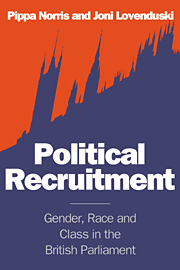Book contents
- Frontmatter
- Contents
- List of figures
- List of tables
- Preface
- 1 Puzzles in political recruitment
- Who selects and how?
- 2 The structure of political recruitment
- 3 Conservative recruitment
- 4 Labour recruitment
- 5 Minor party recruitment
- Who gets selected, and why?
- Does the social bias matter?
- Appendix A Details of the survey design and sample
- Appendix B Questionnaires
- Notes
- Bibliography
- Index
4 - Labour recruitment
Published online by Cambridge University Press: 07 December 2009
- Frontmatter
- Contents
- List of figures
- List of tables
- Preface
- 1 Puzzles in political recruitment
- Who selects and how?
- 2 The structure of political recruitment
- 3 Conservative recruitment
- 4 Labour recruitment
- 5 Minor party recruitment
- Who gets selected, and why?
- Does the social bias matter?
- Appendix A Details of the survey design and sample
- Appendix B Questionnaires
- Notes
- Bibliography
- Index
Summary
This chapter has three aims. The first is to identify the principal features in the Labour party process, particularly the contrasts with the Conservatives. The second is to explain the main steps in the Labour selection process as it operated during the 1987–92 parliament, primarily from the perspective of candidates and selectors. The third is to analyse how the process has changed over time and evaluate the impact of reforms. As before, the issue of how we explain the outcome of the selection process will be left for later chapters.
The main features of Labour party selection
The process of selection in the Labour and Conservative parties shares many characteristics. Both involve a series of distinct stages – application, nomination, shortlisting, selection, and endorsement – with contestants gradually eliminated until a final winner emerges. In both parties the main selection decisions are taken at constituency level. Labour's National Executive Council (NEC) has formal powers to veto candidates, to establish and implement the standard rules (within general principles agreed by party conference), and to intervene more directly in selecting candidates for by-elections. Most significantly, in both parties there has been a shift in selection powers in recent decades, away from the core activists in constituency committees, simultaneously downwards towards party members and upwards towards the national leadership.
Despite these similarities there remain important contrasts between the major parties.
- Type
- Chapter
- Information
- Political RecruitmentGender, Race and Class in the British Parliament, pp. 53 - 76Publisher: Cambridge University PressPrint publication year: 1994



